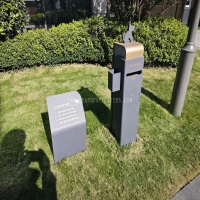Welcome to the website for landscape facilities products and knowledge.
What are the best materials for a landscape bar counter in areas with high humidity and saltwater exposure?
When designing outdoor bars in coastal areas, selecting appropriate countertop materials becomes critical due to the corrosive combination of high humidity and saltwater exposure. Traditional materials often deteriorate quickly under these conditions, requiring frequent replacement and maintenance. Through extensive research and practical testing, several exceptional materials have emerged as superior choices for these challenging environments.
Marine-grade stainless steel (316 grade) stands out as the premier option due to its exceptional corrosion resistance. This alloy contains molybdenum, which provides superior protection against salt-induced pitting and crevice corrosion. Unlike standard stainless steel (304 grade), marine-grade maintains its structural integrity and appearance despite constant exposure to salty air and moisture. Its non-porous surface prevents bacterial growth and allows for easy cleaning with simple soap solutions. While it requires occasional polishing to maintain its lustrous appearance, its durability justifies the minimal maintenance.
Teak wood presents a surprisingly effective natural solution for coastal bars. This dense hardwood contains natural oils and silica that make it remarkably resistant to moisture, rot, and insect damage. Unlike treated lumber that requires chemical preservatives, teak naturally withstands harsh marine conditions without warping or deteriorating. Its natural golden-brown color gracefully weathers to an attractive silver patina if left untreated, though regular oiling can preserve its original hue. The material provides excellent thermal stability, remaining comfortable to touch despite temperature fluctuations.
Quartz surfacing with enhanced resin formulations offers another compelling solution. Modern manufacturing techniques now produce quartz slabs with improved UV stability and moisture resistance specifically for outdoor applications. Unlike natural stone, engineered quartz is non-porous and immune to salt damage and staining. The material maintains consistent color and pattern regardless of environmental conditions, and its seamless installation eliminates moisture-trapping joints. Select products specifically rated for outdoor use with UV protection to prevent fading.
Fiberglass-reinforced polymer (FRP) composites provide exceptional durability in marine environments. These engineered materials combine fiberglass strands with premium resins to create surfaces that are completely impervious to water and salt damage. FRP won't corrode, rot, or support microbial growth, making it ideal for constant exposure to ocean air. The material can be molded into seamless countertops with integrated sinks and drainage systems, eliminating vulnerable joints where moisture could penetrate.
Concrete with advanced sealing technologies has evolved into a viable coastal countertop option. When properly formulated with waterproof additives and sealed with penetrating silane/siloxane sealers, concrete becomes highly resistant to saltwater penetration and corrosion. The mass of concrete provides excellent thermal stability, while modern finishing techniques create surfaces that are both functional and aesthetically striking. Regular resealing (approximately every 2-3 years) maintains its protective barrier.
When selecting materials for coastal bars, consider both performance characteristics and maintenance requirements. Marine-grade stainless steel offers the highest corrosion resistance but may show superficial scratching. Teak provides natural beauty but requires periodic oiling if maintaining its original color. Quartz offers design consistency but must be specifically rated for outdoor use. FRP delivers maximum durability but with limited design options. Concrete provides customizability but needs consistent maintenance.
Proper installation remains equally important as material selection. Ensure adequate drainage slopes, use stainless steel fasteners regardless of counter material, and create ventilation spaces beneath the countertop to prevent moisture accumulation. With the right material choice and installation practices, coastal landscape bars can maintain both functionality and aesthetic appeal despite challenging environmental conditions.
Related search:

Recommendation
Outdoor cat and dog feces trash can; Community pet trash can; Metal multi-color design